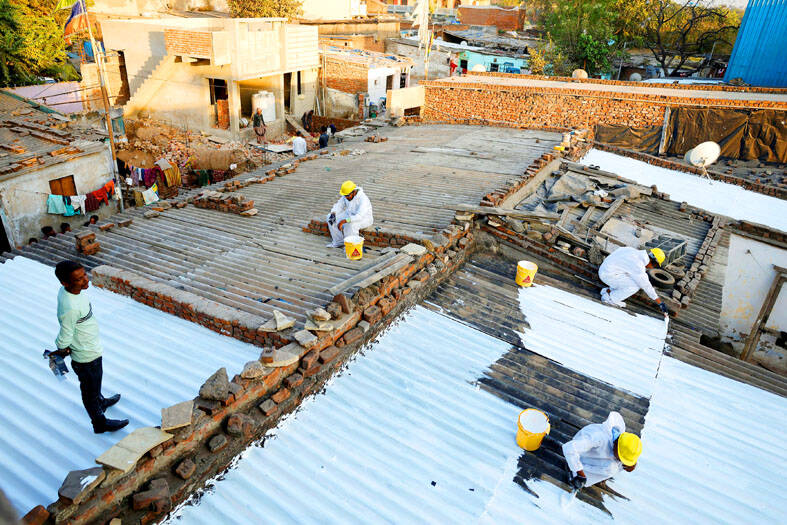Hundreds of roofs in the informal settlements of India’s western Gujarat state have been painted in a reflective, white coating over the past two months to try to keep their occupants cooler as the hottest time of the year approaches.
The effort, which involves 400 households in Ahmedabad, is part of a global scientific trial to study how indoor heat impacts people’s health and economic outcomes in developing nations — and how “cool roofs” might help.
“Traditionally, home is where people have come to find shelter and respite against external elements,” said Aditi Bunker, an epidemiologist at the University of Heidelberg in Switzerland who is leading the project, supported by the UK-based Wellcome Trust.

Photo: Reuters
“Now, we’re in this position where people are living in precarious housing conditions, where the thing that was supposed to be protecting them is actually increasing their exposure to heat,” she said.
As climate change has made India’s summers more extreme, Ahmedabad has suffered temperatures in excess of 46°C.
In the Vanzara Vas slum in the Narol area of the city, which has more than 2,000 dwellings, most of them airless, one-room homes, residents that are part of the project, such as Nehal Vijaybhai Bhil, say they have already noticed a difference.
“My refrigerator doesn’t heat up any more and the house feels cooler. I sleep so much better and my electricity bill is down,” said Bhil, whose roof was painted in January.
Across the world, heat waves that, prior to the industrial revolution, had a one-in-10 chance of occurring in any given year are nearly three times more likely, according to a 2022 study in the journal Environmental Research Letters.
By painting roofs with a white coating that contains highly reflective pigments such as titanium dioxide, Bunker and her team are sending more of the sun’s radiation back to the atmosphere and preventing it from being absorbed.
“In a lot of these low socioeconomic homes, there’s nothing to stop the heat transfer coming down — there’s no insulation barrier from the roof,” Bunker said.
Before joining Bunker’s experiment, Arti Chunara said she would cover her roof with plastic sheets and spread grass over them.
Some days, she and her family sat outside for most of the day, going into the house only for two to three hours when the heat was bearable.
The trial in Ahmedabad is to run for one year, and scientists are to collect health and indoor environment data from residents living under a cool roof — and from those who do not.
Other study sites are in Burkina Faso, Mexico and Niue in the South Pacific, spanning a variety of building materials and climates.
Early results from the Burkina Faso trial show that cool roofs reduced indoor temperature by between 1.2°C in tin and mud-roofed homes, and 1.7°C in tin-roofed homes over two years, which subsequently lowered residents’ heart rates, Bunker said.

Indonesia and Malaysia have become the first countries to block Grok, the artificial intelligence (AI) chatbot developed by Elon Musk’s xAI, after authorities said it was being misused to generate sexually explicit and nonconsensual images. The moves reflect growing global concern over generative AI tools that can produce realistic images, sound and text, while existing safeguards fail to prevent their abuse. The Grok chatbot, which is accessed through Musk’s social media platform X, has been criticized for generating manipulated images, including depictions of women in bikinis or sexually explicit poses, as well as images involving children. Regulators in the two Southeast Asian

COMMUNIST ALIGNMENT: To Lam wants to combine party chief and state presidency roles, with the decision resting on the election of 200 new party delegates next week Communist Party of Vietnam General Secretary To Lam is seeking to combine his party role with the state presidency, officials said, in a move that would align Vietnam’s political structure more closely to China’s, where President Xi Jinping (習近平) heads the party and state. Next week about 1,600 delegates are to gather in Hanoi to commence a week-long communist party congress, held every five years to select new leaders and set policy goals for the single-party state. Lam, 68, bade for both top positions at a party meeting last month, seeking initial party approval ahead of the congress, three people briefed by

The Chinese Embassy in Manila yesterday said it has filed a diplomatic protest against a Philippine Coast Guard spokesman over a social media post that included cartoonish images of Chinese President Xi Jinping (習近平). Philippine Coast Guard spokesman Jay Tarriela and an embassy official had been trading barbs since last week over issues concerning the disputed South China Sea. The crucial waterway, which Beijing claims historic rights to despite an international ruling that its assertion has no legal basis, has been the site of repeated clashes between Chinese and Philippine vessels. Tarriela’s Facebook post on Wednesday included a photo of him giving a

ICE DISPUTE: The Trump administration has sought to paint Good as a ‘domestic terrorist,’ insisting that the agent who fatally shot her was acting in self-defense Thousands of demonstrators chanting the name of the woman killed by a US federal agent in Minneapolis, Minnesota, took to the city’s streets on Saturday, amid widespread anger at use of force in the immigration crackdown of US President Donald Trump. Organizers said more than 1,000 events were planned across the US under the slogan “ICE, Out for Good” — referring to the US Immigration and Customs Enforcement, which is drawing growing opposition over its execution of Trump’s effort at mass deportations. The slogan is also a reference to Renee Good, the 37-year-old mother shot dead on Wednesday in her